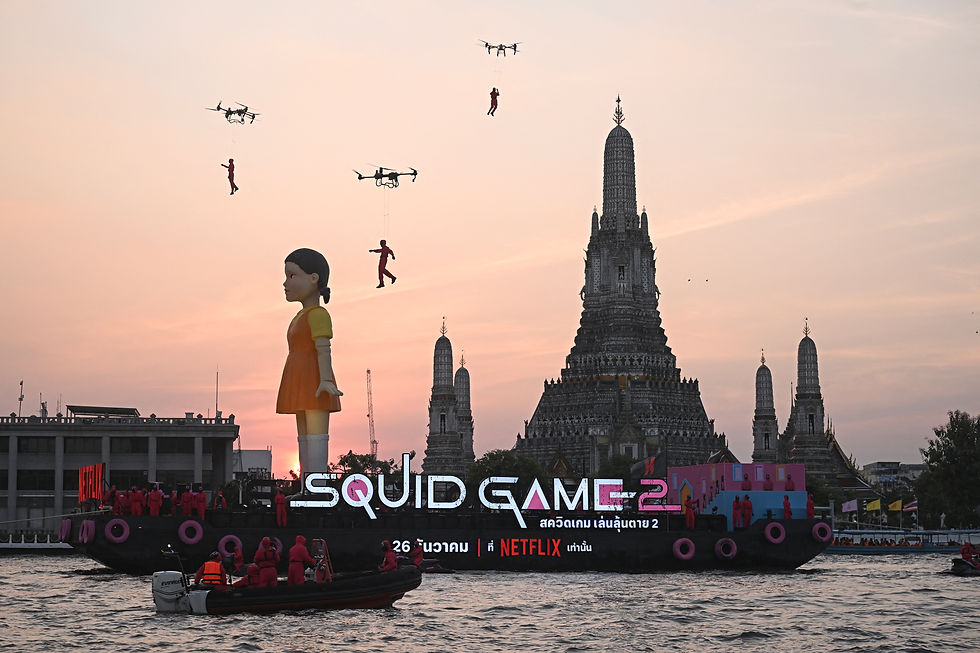THE APPEAL OF THE RUNNING MAN AND SQUID GAME—AND WHAT IT REVEALS ABOUT US
- Melissa Fleur Afshar

- Jul 5, 2025
- 3 min read
Updated: Jul 6, 2025
Newsweek Exclusive Feature
Why do we love watching death game shows? A psychiatrist breaks down our obsession with dystopian survival stories.
As Edgar Wright's trailer for The Running Man trends online ahead of its November release, the popularity of the upcoming film and its predecessor signals our recurring fascination with dystopian spectacles where survival becomes entertainment.
From Netflix's record-breaking Squid Game to the enduring legacy of The Hunger Games, so-called "death game shows" continue to grip the public imagination—particularly among millennial and Gen Z viewers.
The new adaptation of The Running Man, based on Stephen King's 1982 novel, follows a long line of stories centered around human lives being wagered for fame, fortune or spectacle. Experts say these stories, sometimes framed as critiques of capitalism or authoritarianism, have entered mainstream entertainment in a time of increasing digital surveillance, income inequality and disconnection.
"While there is some intrinsic attraction to violence at play," Jordan Conrad, a psychotherapist and founder of Madison Park Psychotherapy, told Newsweek. "Perhaps the larger component drawing audiences to the 'death game show' genre is the increasing sense of alienation felt by so many people."
Conrad, also a published philosopher with contributions to multiple Oxford Handbooks, said the enduring genre reflects how depersonalized many feel in a system that appears to prioritize metrics over meaning.
"Our social interactions are increasingly mediated by programs that we know are surveilling us; our romantic lives have been taken over by apps, and stable features of the 'good life' feel ever out of reach for the average person," Conrad said. "The sum total of this is that our lives feel commodified—the most-important thing about us is our data."
Originally adapted for film in 1987 with Arnold Schwarzenegger in the lead role, The Running Man portrayed a dystopia where selected individuals are forced to fight to the death on live TV.
Decades later, The Hunger Games modernized the concept for a young adult audience, highlighting class divisions and authoritarian spectacle. Then came Squid Game, which exploded globally in 2021 by reframing childhood games as lethal contests for desperate debtors.
These stories can be seen as more than just violent thrillers crafted for entertainment, or as marketing ploys put together by producers who noticed rising public interest in true crime. For younger audiences, they reflect growing anxieties about survival in an increasingly transactional world—and what people are willing to sacrifice for security or relevance.
Conrad draws a parallel between these fictional worlds and the rise of viral internet stunts that degrade or exploit others for public attention.

"Many prominent internet 'celebrities' have become famous for doing awful things—spraying vegetables in supermarkets with poisonous chemicals; licking ice-cream in the store and putting it back; giving unhoused people Oreos filled with toothpaste," Conrad said.
"These are also the behaviors we see in the 'death game show' genre—people enhancing or maintaining their position by getting others, often vulnerable people, to perform degrading and dangerous tasks for the camera."
Streaming services and social-media platforms have further blurred the line between viewer and participant, pushing users into performative roles where attention is currency and personal value is algorithmically determined.
Conrad's observations reach beyond generational grievances. He draws on 19th- and 20th-century thinkers such as Friedrich Nietzsche, Jean-Paul Sartre and Frantz Fanon, who also grappled with the meaning of life under alienating systems.
Other films, while not fitting the "death game" mold precisely, offer adjacent critiques. Bong Joon Ho's Parasite and Ruben Östlund's Triangle of Sadness examine the moral and social costs of status obsession. Bo Burnham's claustrophobic comedy special Inside dissects the mental strain of living in a hyper-digital society.
"Because the essential features of the 'death game show' are the commodification of humanity … and the feeling of the meaninglessness of life, many other movies join the genre," Conrad said. "When prestige is synonymous with value … life can feel futile when you are so far away from having any."
As Wright's update of The Running Man approaches theatrical release, its timely return suggests this fascination is far from fading.
THANK YOU FOR READING
COVER IMAGE CREDIT: GETTY IMAGES
READ THE FULL STORY HERE: The Appeal of the Running Man and Squid Game—and What It Reveals About Us - Newsweek
Comments